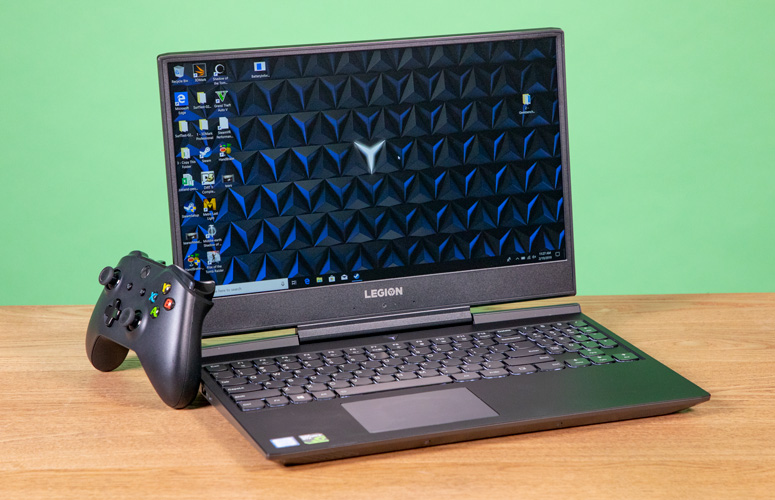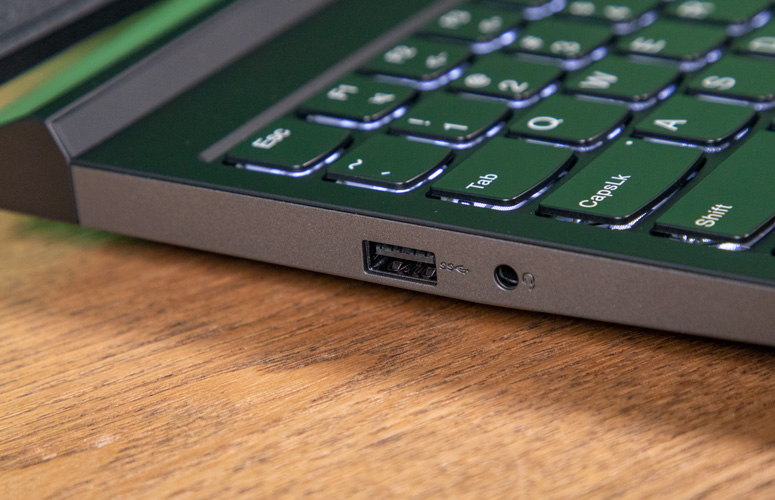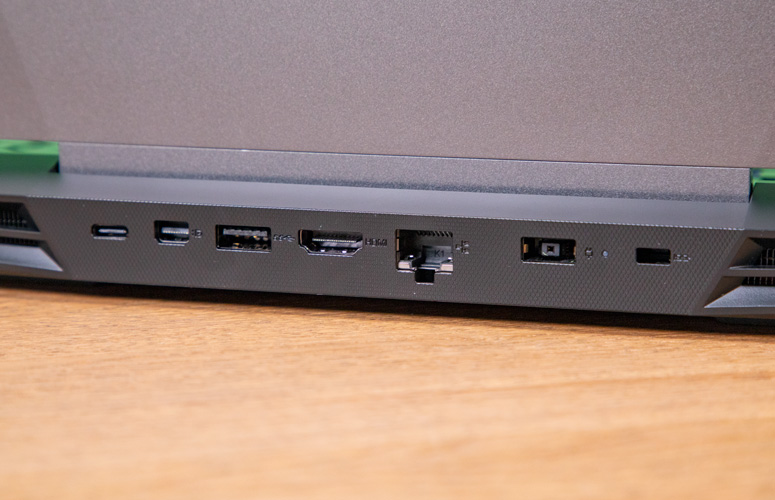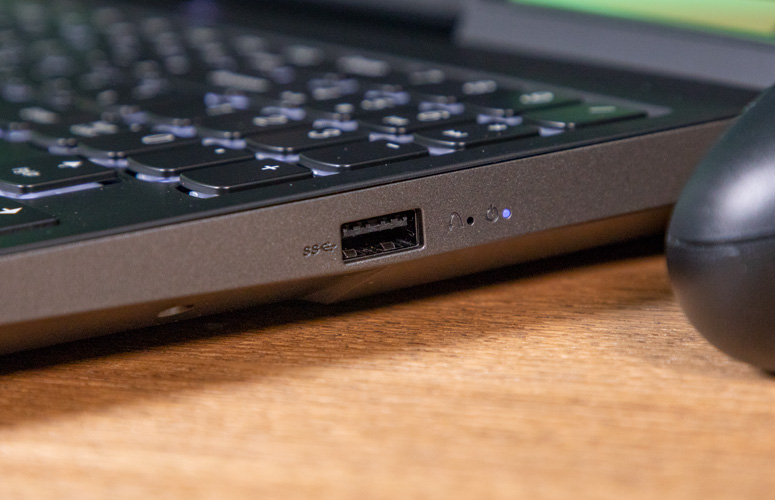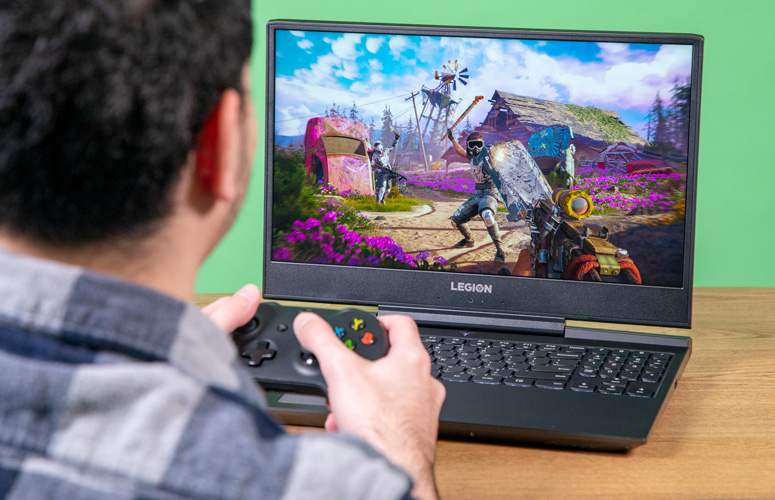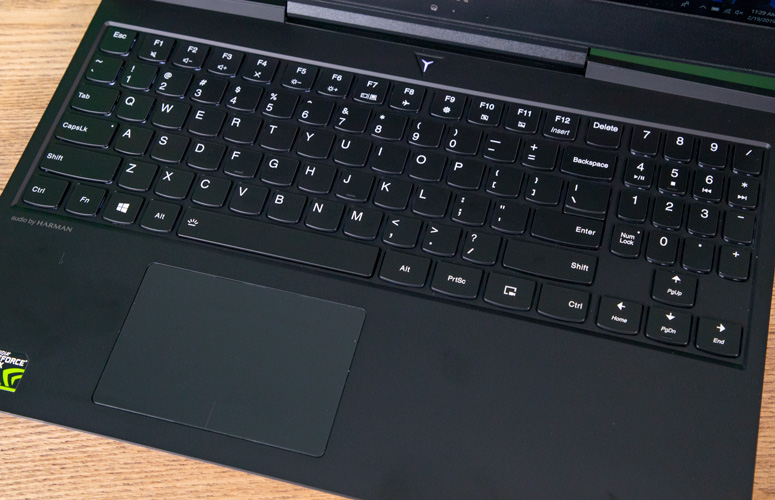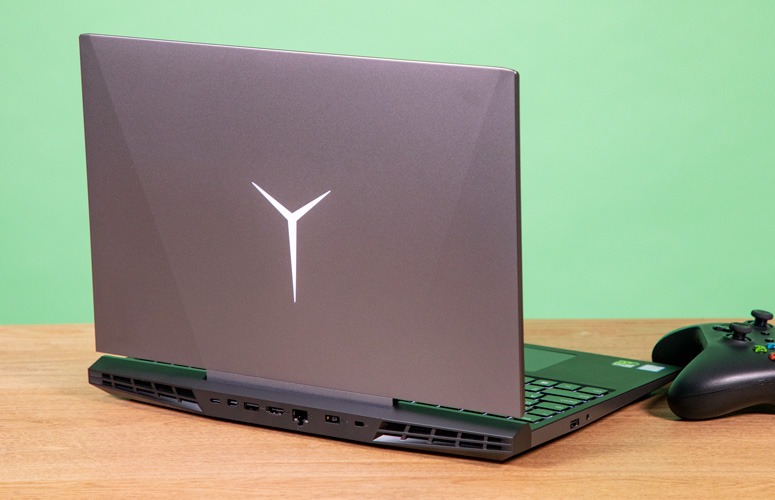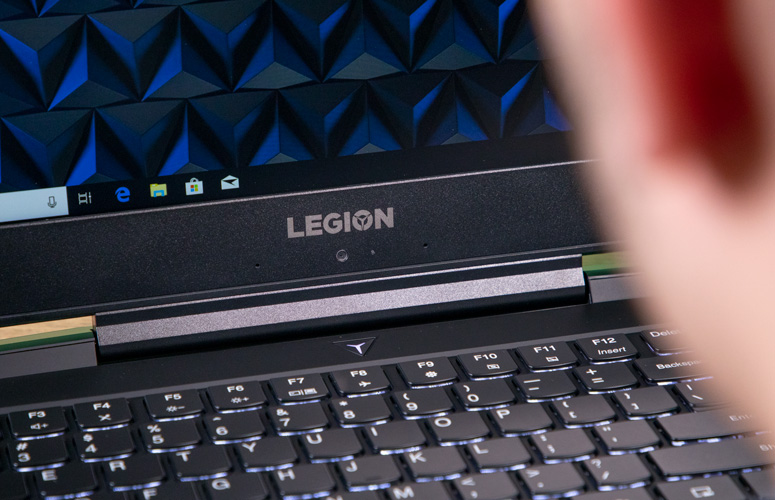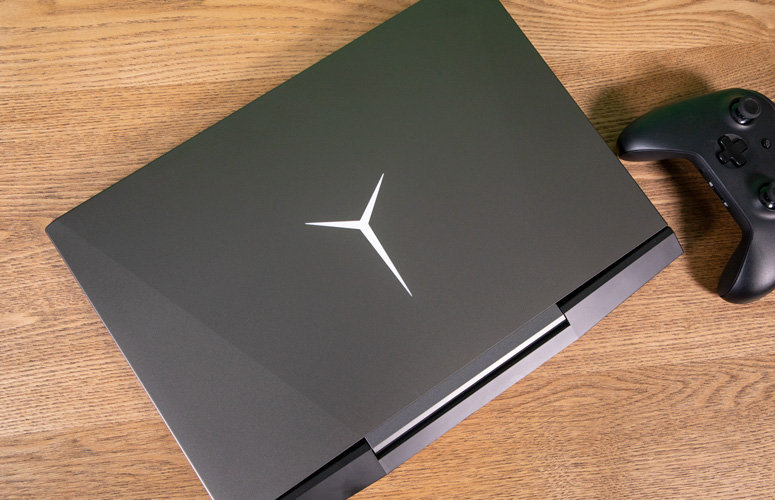Laptop Mag Verdict
The Lenovo Legion Y7000 offers a great design, powerful performance and a supercolorful display, all for an affordable price.
Pros
- +
Sleek, sports car design
- +
Colorful display
- +
Comfortable keyboard
- +
Strong overall performance and graphics
- +
Decent battery life
Cons
- -
Poor audio
- -
Nose cam
Why you can trust Laptop Mag
Quality gaming at an affordable price is not impossible. Selling for $1,099, the Lenovo Legion Y7000 features a strong Core i7 CPU and GTX 1060 GPU packed into a stylish chassis with a comfortable keyboard, a wildly colorful 15.6-inch display and above-average battery life. This machine has some flaws, including its irritating speakers and awkwardly placed webcam. However, the Legion Y7000 is a great overall gaming laptop for the price, and we even named it one of our best VR-ready laptops and best video editing laptops.
Lenovo Legion Y7000 Price and Configuration Options
There's only one configuration of the Lenovo Legion Y7000. It costs $1,099 and comes with a 2.2-GHz Intel Core i7-8750H processor, an Nvidia GeForce GTX 1060 GPU with 6GB of VRAM, 16GB of RAM, a 256GB SSD and a 1TB 7,200-rpm HDD.
Design
The Legion Y7000 features a sleek, Iron Gray aluminum hood that curves down to an angled hinge with vent grills that are reminiscent of a sports car. The white Legion logo sunk in the middle glows as if it were the source of the Y7000's power.
Its ABS plastic interior is lathered in black, and Lenovo's standard keyboard illuminates the keys with white backlighting. The Y7000's bezels are noticeably slim, but that comes at a cost for the webcam, which is placed on the bottom bezel. The hinge is attached by one solid piece in the center, creating a slim gap on the left and right side of that part.
At 5.3 pounds and 14.2 x 10.5 x 1.0-0.9 inches, the Legion Y7000 is lighter and thinner than the Acer Predator Helios 300 Special Edition (5.5 pounds, 1.1 inches) and the Asus TUF Gaming FX705 (6.1 pounds, 15.7 x 11 x 1 inches).
Sign up to receive The Snapshot, a free special dispatch from Laptop Mag, in your inbox.
Ports
The Legion Y7000 has a good selection of ports for gaming and streaming.
On the left there's one USB 3.1 port and an audio jack, while the right side has one USB 3.1 port.
The back of the Legion Y7000 holds the rest of the goodies, like one USB Type-C port, one Mini DisplayPort 1.4, one USB 3.1 port, an HDMI 2.0 port, an Ethernet RJ45 port, the power jack and a Kensington lock slot.
Display
The Legion Y7000's 15.6-inch, 1920 x 1080p panel is surprisingly colorful and sharp, but it could be brighter.
In the latest trailer for Aladdin, I was practically hypnotized by the genie lamp's bold, sparking blue vortex. In the same scene, I could spot individual threads breaking off the top of the Magic Carpet's seams. I wish the display were a little brighter, however, because when Will Smith came out of the lamp, the surrounding background looked noticeably dark.
The Legion Y7000's 15.6-inch, 1920 x 1080p panel is surprisingly colorful and sharp, but it could be brighter.
As I played Shadow of the Tomb Raider, each strand of hair on Lara's head was sharp as it glistened in the light of the sun. The crashed plane in the distance had a distinct red-orangish color that glowed like an emergency flare in the forest. However, even as I explored the sunlit forest, the display wasn't very vibrant.
The Legion Y7000 covered 153 percent of the sRGB color spectrum. That result blows away the 111 mainstream gaming laptop average, which is impressive for a laptop this cheap. This Lenovo also wrecked the Helios 300 (113 percent) and the TUF FX705 (123 percent).
MORE: Best Graphics Performance
At 277 nits, the Legion Y7000 beats the category average (273 nits) and the TUF FX705's score (270 nits) despite looking rather dim in real-world testing. However, it couldn't beat the Helios 300's luminous 312 nits.
Keyboard and Touchpad
The Legion Y7000's keys are so punchy and satisfying to type on that I would have thought my fingers were tap-dancing on a cloud if I didn't know better.
I also appreciate that the keyboard isn't the gaudy, gamer-aesthetic mess that you typically find on cheap gaming laptops. Instead, it's a standard black and white keyboard with a numpad and strong white backlighting.
The Legion Y7000's keys are so punchy and satisfying to type on that I would have thought my fingers were tap-dancing on a cloud if I didn't know better.
The keys measure 1.4 millimeters of travel, which is just a fraction off of our preferred 1.5 to 2.0mm, but they require a solid 71 grams of force to actuate (in line with a 60-gram minimum). I blazed through 78 words per minute on the 10fastfingers.com typing test, passing my typical 66 wpm.
The 4.1 x 2.7-inch touchpad is responsive and soft to the touch, and it offers a meaty click. It also smoothly registered Windows 10 gestures, like two-finger scrolling and three-finger tabbing.
Audio
The Legion Y7000's speakers were somewhat disappointing when I listened to Twenty One Pilots' "Stressed Out." The bassy beats that intro the song were muffled and lacked the proper impact. And when the vocals kicked off, they were too sharp, as if someone had cranked up the treble to max. It was also off-putting to hear the cymbals match and even overwhelm the vocals.
Shadow of the Tomb Raider's bustling forest was filled with birds and frogs, but the chirping and croaking sounded hollow. And when the background music hit a crescendo, it was unpleasantly sharp. The dialogue between Lara and Jonah was loud but lacked bass, so it didn't sound full. A similar effect happened when I fired my arrow and I didn't hear the satisfying bowstring snap I was expecting.
Armed with an Nvidia GeForce GTX 1060 GPU with 6GB of VRAM, the Legion Y7000 didn't miss a step as I ran through the forest in Shadow of the Tomb Raider at max settings.
I tried messing with Lenovo Vantage's Dolby audio settings, but whether I changed my setting to Dynamic, Music or Gaming, the sound consistently sounded sharp and lacked bass.
Gaming, Graphics and VR
Armed with an Nvidia GeForce GTX 1060 GPU with 6GB of VRAM, the Legion Y7000 didn't miss a step as I ran through the forest in Shadow of the Tomb Raider, spotted a baby frog on a rock and shot it with an arrow, all at 35 frames per second (Highest, 1080p).
On the Rise of the Tomb Raider benchmark at Very High settings at 1080p, the Legion Y7000 nailed 37 fps, climbing over the 35-fps average for mainstream gaming laptops. Lenovo's machine also landed between the Helios 300 (38 fps) and the TUF FX705 (36 fps), both of which have the same GPU.
MORE: Best and Worst Laptop Gaming Brands
The Legion Y7000 hit 70 fps on the Hitman benchmark (Ultra, 1080p), a score that tops the category average (66 fps) and the TUF FX705's result but not the Helios 300's mark (72 fps).
While the Grand Theft Auto V benchmark (Very High, 1080p) pushed the Legion Y7000 to its limit, the machine just matched the category average, with 46 fps. Meanwhile, the Helios 300 and TUF FX705 came out ahead, with 51 and 47 fps, respectively.
The Legion Y7000 can perform decently in VR, as it scored a 7 out of 11 on the SteamVR Performance Test. That beats the 6.3 category average as well as the TUF FX705's result (6.9), but the Helios 300 scored a slightly higher 7.9.
Performance
Under the hood of this beast lies a 2.2-GHz Intel Core i7-8750H processor with 16GB of RAM that easily tore through 40 Google Chrome tabs, a 1080p YouTube video and Spotify, all while Shadow of the Tomb Raider was running in the background.
On the Geekbench 4.3 performance test, the Legion Y7000 nailed 22,474, leaving the mainstream gaming laptop average (20,748) and the Helios 300 (20,595) in the dust. However, the TUF FX705 topped both laptops, with 23,179. They all had the same CPU, but the TUF FX705 has double the RAM, at 32GB.
The Legion Y7000 took 38 seconds to match 65,000 names and addresses on our Excel test, meaning this machine is a few seconds faster than the 0:42 category average and the Helios 300 (0:45). The TUF FX705 finished the test at a much faster 9 seconds.
On the HandBrake benchmark, the Legion Y7000 transcoded a 4K video to 1080p in just 9 minutes and 24 seconds, crushing the category average (11:10), the Helios 300's time (10:30) and the TUF FX705's mark (10:45).
Lenovo's 256GB SSD copied 4.97GB of data in 8 seconds, for a blazing-fast transfer rate of 636 megabytes per second that nearly doubles the 328-MBps category average. While the 256GB SSDs in the Helios 300 and TUF FX705 trumped the average, at 364 MBps and 392 MBps, respectively, they weren't anywhere near the Legion's rate.
Battery Life
The Legion Y7000 has pretty decent battery life for a gaming laptop. When I continuously surfed the web over Wi-Fi at 150 nits of brightness, the battery lasted 4 hours and 28 minutes. The Legion performed slightly above the 4:26 category average and even outlasted the Helios 300 (3:00) and TUF FX705 (4:19).
Webcam
Even if the Legion Y7000's webcam were good (it's not), it would still be completely useless because of its placement on the bottom bezel, as it just stares at my chest and nostrils.
The test shots I took were super grainy, and the ceiling lights in the background blew out half of the ceiling. However, to its credit, the webcam did capture the color in my blue and red shirt rather well.
Heat
While the Legion Y7000 can get hot under the hood, it's at most warm to the touch. After I played Shadow of the Tomb Raider for 15 minutes, the underside hit 123 degrees Fahrenheit, which is above our usual 95 degree comfort threshold. The center of the keyboard and touchpad measured 105 and 81 degrees, respectively. The hottest this machine got was 139 degrees, on the right vent on the underside.
On our normal heat test, the Legion Y7000's underside hit 102 degrees after the machine streamed a 15-minute HD video, while the center of the keyboard registered 85 degrees and the touchpad reached 94 degrees.
Software and Warranty
Lenovo throws in its usual Vantage app, which you can use to monitor your CPU, GPU, RAM and drives. The Optimizer tool can automatically manage your RAM, the Power tab lets you customize battery usage, and the Wi-Fi Security section can help you distinguish safe wireless networks from dangerous ones. You can also run a hardware scan and check your warranty through an app.
The Legion also features Lenovo's proprietary App Explorer, which hosts a bunch of apps and games, like Skype and Sonic Dash. And, of course, Windows 10 has its own apps already pre-installed on the device, like Cooking Fever, Candy Crush Saga and Township.
The Legion Y7000 comes with a one-year limited warranty. See how Lenovo performed on our Tech Support Showdown, Best and Worst Brands, and Best and Worst Gaming Brands rankings.
Bottom Line
The Lenovo Legion Y7000 is an affordable gaming laptop with premium features. On top of offering impressive gaming power via its GTX 1060 GPU, it has a quality chassis with a punchy keyboard, a vivid panel and solid battery life. However, the laptop's audio quality and webcam are disappointing.
For $1,399, you can get the Acer Predator Helios 300 Special Edition, which offers a brighter display, a webcam in the right place and slightly better gaming performance.
But overall, for $1,099, the Legion Y7000 is an awesome mainstream gaming laptop.
Credit: Laptop Mag
Lenovo Legion Y7000 Specs
| Bluetooth | Bluetooth 4.2 |
| Brand | Lenovo |
| CPU | 2.2 GHz Intel Core i7-8750H processor |
| Display Size | 15.6 |
| Graphics Card | Nvidia GeForce GTX 1060 GPU |
| Hard Drive Size | 256GB SSD |
| Hard Drive Type | SSD |
| Highest Available Resolution | 1920 x 1080 |
| Native Resolution | 1920x1080 |
| Operating System | Windows 10 Home |
| Ports (excluding USB) | USB 3.1, RJ-45, Mini DisplayPort, Headphone/Mic, HDMI 2.0, USB 3.1 with Type-C |
| RAM | 16GB |
| Secondary Hard Drive Size | 1TB |
| Secondary Hard Drive Speed | 7,200 |
| Secondary Hard Drive Type | HDD |
| Size | 14.21 x 10.5 x 1.06 -- 0.89 inches |
| Touchpad Size | 4.1 x 2.7-inch |
| USB Ports | 4 |
| Video Memory | 6 GB |
| Warranty/Support | One-year limited warranty |
| Weight | 5.27 pounds |
| Wi-Fi | 802.11ac |

Rami Tabari is the Reviews Editor for Laptop Mag. He reviews every shape and form of a laptop as well as all sorts of cool tech. You can find him sitting at his desk surrounded by a hoarder's dream of laptops, and when he navigates his way out to civilization, you can catch him watching really bad anime or playing some kind of painfully difficult game. He’s the best at every game and he just doesn’t lose. That’s why you’ll occasionally catch his byline attached to the latest Souls-like challenge.
